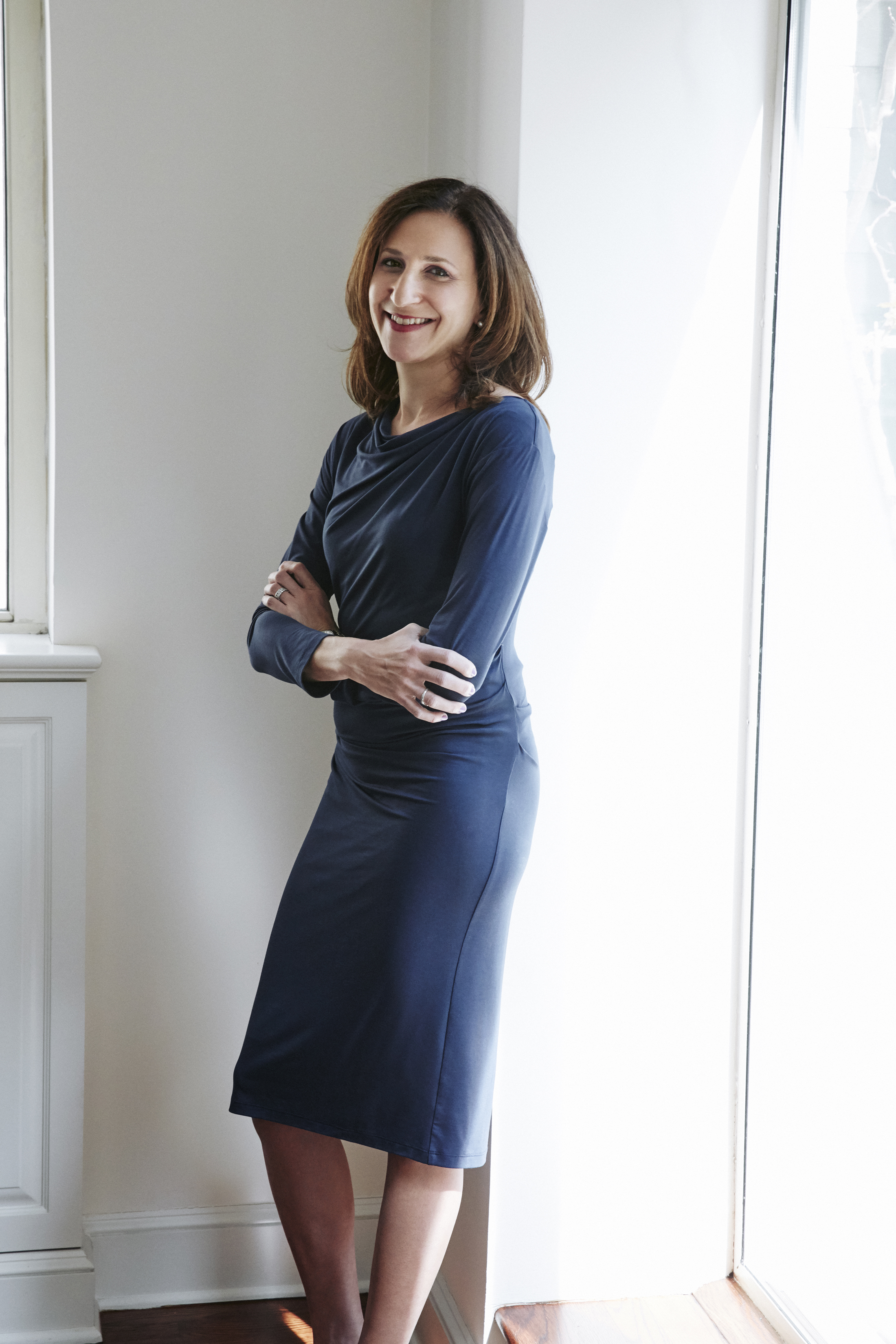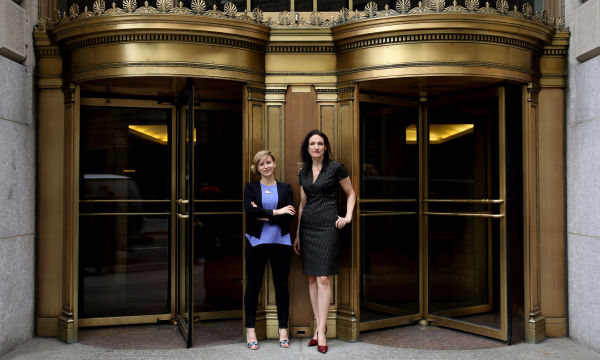Ampersand Women: How the Founders of Fairygodboss Are Making Workplaces More Female-friendly
April 02, 2016 | Filed in: Woman of the Week
When you’re interviewing for a job, there are certain questions you’re expected to ask. And then there’s the stuff you really want to know, but can’t ask outright: Do women get promoted at the same rate as men? Is the company culture one in which women feel supported? What’s the maternity-leave policy (and is it actually respected)? For those questions, there’s Fairygodboss, a crowd-sourced platform that allows women to candidly review and share information about the companies where they work.
The site offers detailed company reviews; ranks employers based on their maternity-leave policies (according to the site, Netflix offers employees a whopping 52 weeks of paid leave, while Berkshire Hathaway gives just five); provides compensation data by industry; and even has a section for work-related confessions. In short, it’s a safe space for women to share their experiences at various companies in order to help guide other women towards making smart career decisions.
We recently caught up with founders Georgene Huang and Romy Newman to hear about how their own professional paths—they met as colleagues at Dow Jones, where Georgene was the Head of Enterprise Business and Romy was Head of Digital Advertising—led them to launch this venture.

Meeting of the minds: Georgene in the Annie dress and Romy in the Annabel dress.
How do you hope Fairygodboss will move the needle for professional women?
Romy: There’s a social mission built into our business. We want to improve the workplace for women by creating transparency. If we expose the way women really feel about their jobs and make that information available, it will help companies make improvements. They’ll better understand how their female employees feel about policies and culture.
Did the idea come out of personal experiences you had at work?
Georgene: I lost my job when my company reorganized, and at the time, I was two months pregnant. It put me in an awkward position because I wasn’t showing and hadn’t told anyone, and here I was interviewing for jobs, knowing that I was going to leave to have a baby in seven months. I had so many questions—about maternity policies, about what hours employees were expected to work—that I didn’t feel comfortable asking in interviews. So I went online to try to get information, but there wasn’t much transparency. The few review sites that existed were focused on money or interview tips. So we decided to launch Fairygodboss to create a place where women could share in-depth information with each other—the information you usually don’t have access to from the outside of a company—and where employers can tell their own stories.
Romy: I grew up thinking I could be a CEO, but after my daughter was born, I realized that being a senior executive in a corporate function wasn’t compatible with being the kind of parent I wanted to be. It was startling. As I adjusted to life as a mom, I realized this wasn’t a one-year thing. This was a twenty-year thing. It’s not only going to matter if I make it home for dinner this year; it will be better if I’m home for dinner for the next twenty years. So I left my full-time job in marketing to consult, and ultimately, I reconnected with Georgene to launch this project. There’s a real tension between being a successful executive and being a great parent, and we want to inspire companies to improve their policies to help relieve this tension for both men and women.

Romy in the Annabel dress.
Why did you decide to make Fairygodboss a female-only site?
Romy: Having a “gated community” allows women to feel more comfortable being candid. We hear from our users that they sometimes feel isolated or lonely at work, particularly as they rise in the ranks, and they’re looking for a place to share their experience with other women.
Any surprising learnings so far?
Romy: We took an in-depth look at the law industry at one point. In the past few years, the industry has largely expanded maternity-leave policies to as many as 20+ weeks. But when it came to how those policies played out in reality, it was a mixed bag. Half of the reviews said, “The company respected my 20 weeks and was great about me coming back.” And then the other half said, “I got 20 weeks, but after nine, my boss started calling and asking when I was coming back.”
Georgene: Or sometimes companies promise flexibility, but it’s at the cost of advancing. So part-time or flex-time roles are available, but you’re ultimately being penalized if you take one.
So the user reviews bring all this to light.
Romy: Exactly. The user reviews are the backbone of Fairygodboss. They’re moving and insightful and balanced. One theme is that women face discrimination in many ways that are often unintended. It’s sort of death by a thousand cuts. It doesn’t boil down to just one episode where someone said the wrong thing, or another instance where a woman feels she didn’t get the promotion she deserved. But all those things add up over the course of a career.

Georgene in the Annie dress.
Which companies or industries are leading the pack when it comes to creating satisfying workplaces for women?
Romy: The companies that are actively investing in gender diversity—Apple, Google, Accenture, Salesforce. These companies have put money into initiatives that help women fit into the workplace, so it’s no surprise that they rank highest for female job satisfaction.
Georgene: Job satisfaction tends to be higher in female-dominated industries. The industries that score the lowest are very traditional, male-dominated, “old” industries like finance and law. The ones that score the highest are industries like cosmetics and PR, where there are a lot of women. I think some of that has to do with role-modeling, and some of it has to do with the policies and culture at those places.
Do you think Fairygodboss will end up affecting companies’ policies when it comes to gender diversity?
Georgene: We hope so. By putting everything out there—scores and reviews—we’re putting pressure on employers to take responsibility for their reputation in the eyes of current and future female employees. We’ve been really surprised by how great many employers have been about speaking to us about their intentions, programs, and policies. We want to give them a voice as well.
You’ve both had fascinating careers. What advice would you give for women just starting out?
Romy: Get some sales experience! In college, I worked at the Gap—literally folding shirts—and it has given me a leg up in all of my roles since. Everything in life is sales. Now that we’re pitching investors and the press, we’re selling our idea all the time. Even trying to get my son into kindergarten took sales skills!
Georgene: Don’t stress so much as your career unfolds. I went from wanting to be a classical musician, to studying law, to working in finance, to launching my own venture. Things generally work out, but you can’t predict or control how. Many ambitious women put a lot of pressure on themselves to have their careers mapped out and to achieve certain milestones by certain ages. I don’t think that’s necessary. A lot of that pressure comes from inside, or from reading too much Entrepreneur. Remember that a career is long. You have plenty of time to change course as you find your way.
Photos by Takahiro Ogawa








